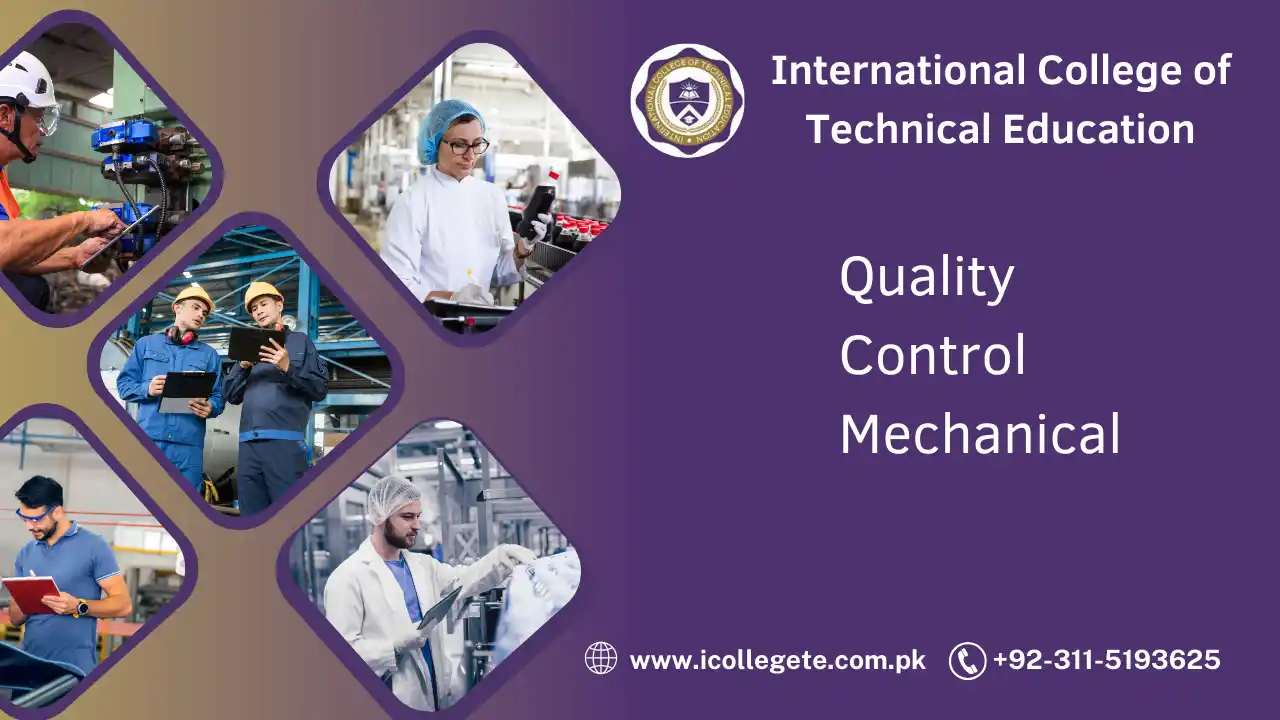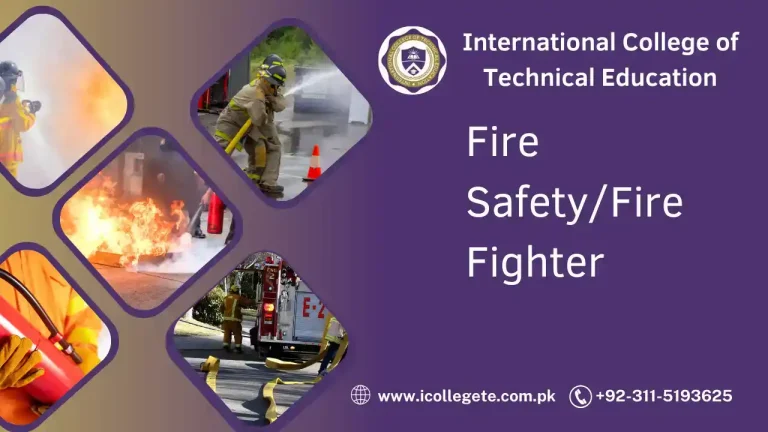In the mechanical engineering field, ensuring the highest standards of quality is crucial for the safety, efficiency, and longevity of mechanical systems. From designing machinery to overseeing large-scale industrial projects, maintaining consistent quality is key. The Quality Control Mechanical Course in Islamabad is designed to provide professionals with the knowledge and hands-on skills needed to oversee mechanical systems’ quality, performance, and compliance with industry standards. This course offers a detailed understanding of mechanical system testing, inspection, and continuous improvement, making it ideal for individuals aiming to excel in mechanical engineering and quality control roles.
The Quality Control Mechanical Course in Islamabad is tailored to equip participants with the practical skills and theoretical knowledge required to apply quality control principles in mechanical engineering. The course focuses on critical aspects such as material testing, quality inspection techniques, mechanical component evaluation, and ensuring compliance with safety and industry standards. This course is suitable for those working in the manufacturing, construction, automotive, and energy sectors, where high-quality mechanical systems are essential for operational efficiency and safety.
Course Overview
The Quality Control Mechanical Course provides an in-depth understanding of the quality control processes specific to mechanical engineering. Participants will learn to evaluate the performance and durability of mechanical components, implement testing procedures, and understand how to prevent common mechanical faults. The course also emphasizes the importance of effective communication and documentation in maintaining quality standards.
Throughout the course, students will explore topics such as material selection, dimensional analysis, inspection processes, and the latest technologies used for quality control in mechanical engineering. With practical sessions and theoretical lessons, participants will gain the skills necessary to manage quality control in real-world mechanical systems.
Study Units
The Quality Control Mechanical Course is structured into the following key study units:
- Introduction to Quality Control in Mechanical Engineering
- Importance of quality control in mechanical systems
- Overview of industry standards and regulations
- Key concepts of quality assurance in mechanical engineering
- Mechanical Materials and Component Testing
- Material properties and testing methods (tensile, hardness, etc.)
- Techniques for testing mechanical components (gears, bearings, pumps, etc.)
- Understanding material failure and its impact on mechanical systems
- Inspection Techniques and Measurement Tools
- Dimensional and visual inspection methods
- Calibration and use of measurement tools (micrometers, calipers, CMM machines)
- Non-destructive testing methods (ultrasonic, magnetic particle, X-ray)
- Quality Control in Manufacturing Processes
- Monitoring and controlling manufacturing processes (casting, welding, machining)
- Process control techniques and statistical process control (SPC)
- Addressing quality issues during production
- Troubleshooting and Maintenance of Mechanical Systems
- Identifying mechanical system failures and malfunctions
- Preventive and corrective maintenance strategies
- Root cause analysis techniques for mechanical issues
- Quality Control Documentation and Reporting
- Importance of documentation in quality control
- Developing inspection and testing reports
- Communicating quality findings effectively to stakeholders
- Advanced Quality Control Technologies in Mechanical Engineering
- Implementation of modern quality control technologies (automation, AI, and robotics)
- Data analysis for quality assurance
- Trends and innovations in mechanical quality control systems
Learning Outcomes
By the end of this course, participants will be able to:
- Understand the principles and practices of quality control in mechanical engineering.
- Apply testing methods to assess the quality of mechanical materials and components.
- Utilize various inspection tools and techniques to monitor mechanical system performance.
- Implement quality control in manufacturing processes to ensure product consistency and reliability.
- Troubleshoot and resolve mechanical system faults with root cause analysis techniques.
- Prepare and maintain quality control documentation, including inspection and test reports.
- Stay updated on modern technologies and techniques used in mechanical quality control.
Course Benefits
The Quality Control Mechanical Course offers numerous benefits to participants:
- Hands-On Experience: Gain practical, hands-on experience with modern testing and inspection tools, preparing you for real-world challenges in mechanical quality control.
- Industry-Relevant Knowledge: Learn about the latest industry standards, technologies, and best practices, keeping you at the forefront of mechanical engineering.
- Career Advancement: Enhance your qualifications and skill set, opening the door to higher-paying roles and greater job opportunities within the mechanical and manufacturing sectors.
- Certification: Receive a certificate of completion that validates your expertise in quality control and can help you stand out in a competitive job market.
- Networking Opportunities: Build connections with industry professionals, instructors, and peers, which may lead to job opportunities, collaborations, and professional development.
Who is This Course For?
The Quality Control Mechanical Course is ideal for:
- Mechanical Engineers: Professionals looking to expand their expertise in quality control for mechanical systems.
- Manufacturing and Production Supervisors: Individuals who oversee production lines and want to ensure the mechanical systems and products meet the required quality standards.
- Technicians and Inspectors: Those working with mechanical components and systems who want to specialize in testing, inspection, and quality control.
- Project Managers: Professionals who manage mechanical engineering projects and need to ensure quality throughout the project lifecycle.
- Recent Graduates: Fresh graduates in mechanical engineering or related fields who wish to gain practical skills in mechanical quality control.
- Quality Control Specialists: Individuals aiming to move into quality control roles within mechanical engineering sectors.
Future Progression for This Course
The Quality Control Mechanical Course lays the foundation for several career progression paths:
- Specialized Roles: Graduates can pursue specialized positions such as Quality Control Engineer, Quality Assurance Manager, or Mechanical Testing Technician.
- Senior Management Roles: With the expertise gained, participants can move into higher management positions such as Operations Manager, Production Manager, or Plant Manager.
- Certifications and Advanced Studies: This course serves as a stepping stone to advanced certifications in mechanical quality control, Six Sigma, or ISO standards, offering further specialization.
- Consultancy Opportunities: Experienced professionals can transition into consultancy roles, providing advice and solutions on quality control processes in the mechanical industry.
- Entrepreneurship: With strong expertise in quality control, graduates may also choose to start their own businesses, providing mechanical testing, inspection, and consulting services to industries.
The Quality Control Mechanical Course in Islamabad is a valuable opportunity for individuals aiming to enhance their skills in mechanical engineering and quality control. With comprehensive training in the latest inspection techniques, testing methods, and quality assurance practices, participants will be prepared to ensure that mechanical systems perform at their best. Whether you’re an engineer, technician, or project manager, this course offers essential skills that will help you excel in the mechanical industry and drive quality improvements across a variety of sectors.






